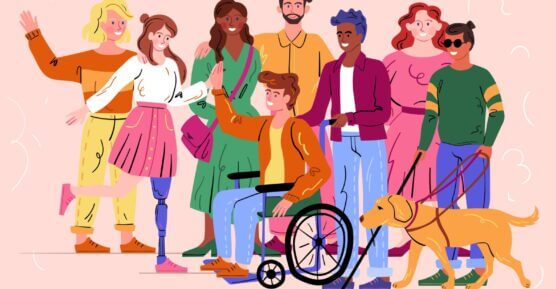
Page contents
Across the UK, over 16 million people are living with a disability, which makes up 24% of the total population. While over 15 million have a long term health condition, according to the Nuffield Trust.
Living with an illness or disability is physically and emotionally challenging, but it can also have a detrimental impact on your personal finances.
There are many benefits available for ill and disabled people to support them financially with the challenges they face. It is a good idea to be aware of what these are, as you may not realise you are actually eligible for them.
What benefits can you get if you are ill and disabled?
There are a number of benefits available for those who are ill or disabled. These benefits aim to support a person with returning to work or give financial help if they are unable to work, either short or long term.
Employment and Support Allowance (ESA)
Employment and Support Allowance (ESA) seeks to help with the cost of living and support you to return to work (if this is a possibility).
To be eligible for ESA you need to have:
- Worked as an employee or have been self-employed
- Paid enough National Insurance contributions, usually in the last 2 to 3 years or have received National Insurance credits
In some cases, you can receive ESA alongside other benefits, but this excludes Jobseeker’s Allowance and Statuary Sick Pay if you are claiming ‘new style’ ESA.
Personal Independence Payment
If you have a long-term health condition or disability, Personal Independence Payment (PIP) can give you extra money to help you manage day to day life. PIP is available for people between 16 and State Pension age.
There are two components of PIP.
Daily Living and Mobility and these are paid at different rates.
Current PIP rates in 2025/26
- Daily Living
- Standard: £73.90 per week
- Enhanced: £110.40 per week
- Mobility
- Standard: £29.20 per week
- Enhanced: £77.05 per week
Disability premiums
Disability premiums are an extra amount of money added on to benefits you already receive, including Job Seeker’s Allowance and Employment and Support Allowance. This is usually added automatically based on the information you have given. So in most cases you won’t have to apply for disability premiums separately.
There are three types of disability premiums:
- Disability premium
- Severe disability premium
- Enhanced disability premium
Depending on your type and severity of disability, you can receive more than one premium at the same time. If you receive income-related ESA you cannot get the disability premium, but you might be eligible for the severe and enhanced premiums.
Universal Credit
If your disability or health prevents you from working, you may receive an enhanced rate for Universal Credit.
You might be eligible for this payment if all of the following apply:
- You (or your partner) were entitled to Income Support, income-based Jobseeker’s Allowance or income-related Employment and Support Allowance.
- You were entitled to the severe disability premium within the month immediately before the first day of your Universal Credit award.
- You’re still eligible for the severe disability premium at the start of your Universal Credit claim.
- You’ve not joined an existing Universal Credit claim.
Statutory sick pay
If you are currently employed but are too ill to work, you may be entitled to Statutory Sick Pay. In 2025, this is £118.75 per week, and can be paid for up to 28 weeks. You will need to earn at least £125 a week to be eligible.
Whilst £118.75 is the minimum payment that most people will receive, if your company has a scheme, you may be paid more. You should ask your employer or have a look at your contract of employment.
What benefits are available if you need care?
If you are ill or disabled and you need care, there are additional benefits that you might be entitled to.
Industrial Injuries Disablement (IIDB)
Industrial Injuries Disablement (IIDB) is a payment of up to 225.30 if you have a disability or an illness which is a result of an accident in the workplace, or an illness caused by work.
The payment amount is determined through your assessed level of disablement.
Attendance Allowance
Attendance Allowance is available for people over State Pension Age.
There are two rates available, determined by the level of support you require. However, it does not cover mobility needs. You may need to be assessed by a healthcare professional if it is unclear how your condition affects you.
Attendance Allowance rates 2025/26
Attendance Allowance is paid weekly into your bank account at a lower or higher rate depending on your needs.
- Lower rate: £73.90
- Higher rate: £110.40
People who need personal support or supervision during the day, or supervision at night, qualify for the lower rate.
Those who need further assistance and require help or supervision during both day and night get the higher rate. People who have been diagnosed with a terminal illness are also eligible for the higher rate.
Constant Attendance Allowance (CAA)
If you are ill or disabled as a result of an injury and require constant care, you could be entitled to Constant Attendance Allowance. You must receive either Industrial Injuries Disablement Benefit (IIDB) or a War Disablement Pension to claim CAA.
What benefits can help with living costs?
There are a range of benefits available to UK residents who require additional help with their living costs but may not be entitled to benefits specifically catered to people who are ill or have a disability.
Other benefits include:
Job Seeker’s Allowance (JSA)
If your illness or disability doesn’t prevent you from working, but you are currently in the process of looking for a job, then you may be entitled to Job Seeker’s Allowance (JSA).
To receive JSA, you will need to attend an interview at your local JobCentre Plus office – this is usually held over the phone, but you may be asked to visit your local office in person. You will need to keep to your agreement of looking for work to continue receiving JSA, this agreement is called the ‘Claimant Commitment’, and the details of this will be decided during your initial interview.
Pension Credit
If you are over State Pension age and receive a low income, Pension Credit can provide additional income to help with living costs, including housing costs.
Pension Credit is available in England, Scotland and Wales and is separate to State Pension. If you live with a partner, they must be included in your application (this applies if you live together, even if you are not married).
You should be eligible for Pension Credit if:
- You and your partner have both reached State Pension age.
OR
- One of you is getting Housing Benefit for people over State Pension age.
If you receive an income, this will be calculated to determine how much Pension Credit you receive. An income includes State Pension, other pensions, earnings from employment and self-employment and most social security benefits, for example Carer’s Allowance.
End of life benefits
Benefits available for people with a terminal illness have recently been extended. So they are payable a year before death at the highest rate.
You can also apply for PIP if you have been diagnosed with a terminal illness, but to receive this your GP or other medical professional must believe you might have six months or less to live. You will need to be over the age of 16 and have generally not reached State Pension Age.


